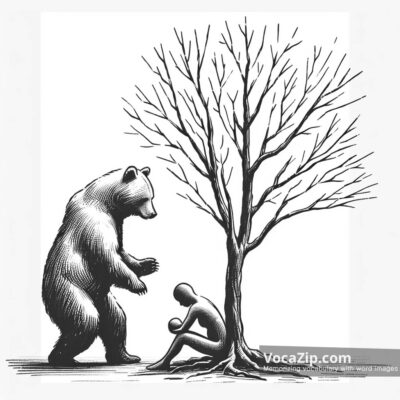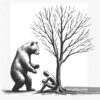bear meaning
bear :
a large, heavy animal with thick fur
noun
▪ The bear is sleeping in the cave.
▪ The big animal is sleeping in the cave.
▪ Bears like to eat fish and berries.
▪ Big animals like to eat fish and berries.
paraphrasing
▪ grizzly – a type of bear
▪ polar – a type of bear
▪ panda – a type of bear
▪ cub – a baby bear

bear :
to carry, to support
verb
▪ She bears a heavy load.
▪ She carries a heavy load.
▪ He cannot bear the pain.
▪ He cannot support the pain.
paraphrasing
▪ carry – to hold or support
▪ endure – to handle or go through
▪ sustain – to keep up or maintain
▪ uphold – to support or maintain
Pronunciation
bear [bɛər]
The stress is on the whole word, and it sounds like 'bare'.
Common phrases and grammar about bear
bear - Common meaning
noun
a large, heavy animal with thick fur
verb
to carry, to support
Part of Speech Changes for "bear"
▪ bearer (noun) – someone who carries something
▪ bearing (noun) – the way someone carries themselves
Common Expressions with "bear"
▪ bear a burden – to carry a heavy load
▪ bear fruit – to produce results
▪ bear in mind – to remember or consider
▪ bear witness – to provide evidence
Important examples of bear in TOEIC
Vocabulary examples from the TOEIC test
In TOEIC vocabulary questions, bear often means to carry or support something.
Example of a confusing word: bare (uncovered or exposed)
Grammar examples from the TOEIC test
Bear is often used in grammar questions to show ability or endurance.
bear
Idioms and fixed expressions in TOEIC
bear the brunt
means 'to receive the worst part of something'.
grin and bear it
means 'to accept something unpleasant without complaint'.
Differences between similar words and bear
bear
,
carry
differences
Bear means to support or endure, while carry often means to physically hold something.
bear
,
endure
differences
Bear often means to carry or support, while endure means to withstand or tolerate over time.
Words with the same origin as bear
The origin of bear
The word bear comes from the Old English 'beran', meaning to carry or bring.
Word structure
The word's composition is unclear.
Words with the same origin
The word's root is unclear or difficult to confirm.
Please select an image in the quiz
Previous post and next post


accurately
859
correctly, precisely
adverb ┃
Views 3






